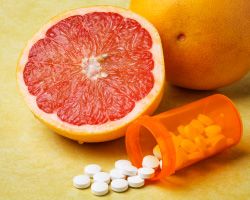Health library
Back to health libraryWhen food and medications don’t mix

Oct. 10, 2022—Did you know that some common foods can change the way some medications work? You and your doctor have probably discussed how your medications may interact with each other. But your diet choices can also affect how drugs are absorbed or metabolized in your body. In some cases, they change the way your body absorbs the medicine. It might not work as well—or it might build up in your body. In some cases, certain foods can increase the effects of a medicine.
Steer clear of these food-med combos
Many foods can affect how well medications work. Here are some examples of common combos to avoid, based on information from AARP, the American Heart Association and others.
- Grapefruit and grapefruit juice can cause problems when mixed with certain medicines. That includes statins, which are used to control cholesterol; certain antianxiety drugs; and some medications that treat Crohn’s disease or ulcerative colitis. Seville oranges, pomelos and tangelos may have the same effect.
- Aged cheese, smoked and cured meats, and fermented foods can interact with MAOIs, which are used to combat depression and treat Parkinson's disease. These foods are high in tyramine. If you take an MAOI, you should also avoid other foods that contain high levels of tyramine, such as red wine, some draft beer, soy products and very ripe bananas.
- Fruit juices, such as grapefruit, apple and orange juice, can make certain blood pressure drugs and antihistamines less effective.
- Dairy products, because of their calcium content, can interfere with certain antibiotics.
- Leafy greens and other foods containing vitamin K can reduce the effectiveness of the anticoagulant warfarin. Your healthcare provider can suggest how to balance vitamin K-rich foods with your warfarin dosage.
- Bananas and other potassium-rich foods can cause heart arrhythmias when taken with ACE inhibitors that lower blood pressure.
- High-fiber foods can make levothyroxine (used to treat an underactive thyroid) and digoxin (used to treat heart failure) less effective.
Put safety on the menu
To play it safe and keep trouble off of your plate, ask your pharmacist or doctor about the medicines you take. Also carefully check the written information that comes with your prescriptions when you pick them up from the pharmacy.
If any of your medicines interact with foods and drinks, pay attention to ingredient lists. For example, if you are trying to limit a certain vitamin, you’ll want to watch out for fortified foods.
Did you know that alcohol and medication can also be a dangerous mix? Find out more.
